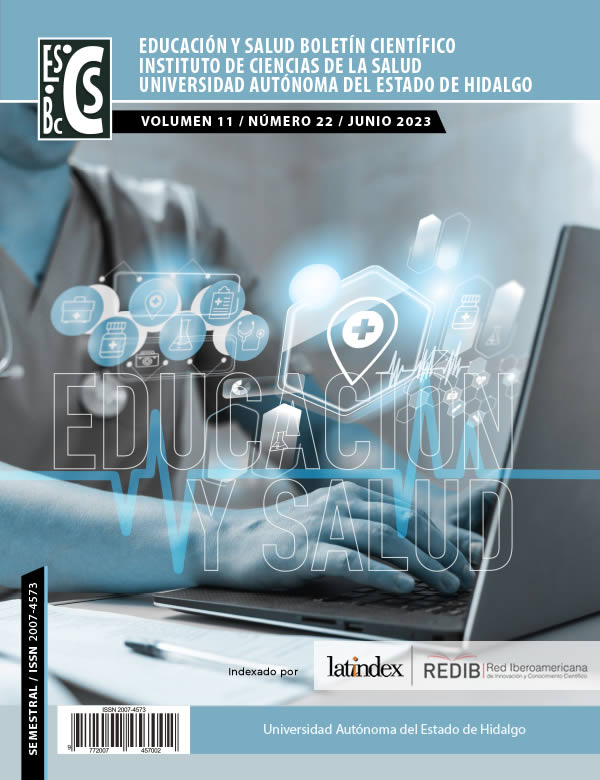Risk factors for school dropout in high school students during the pandemic COVID-19. Content validation of an instrument
DOI:
https://doi.org/10.29057/icsa.v11i22.10588Keywords:
Dropout, education, content validity, risk factors, instrument validationAbstract
As a result of the SARS-COV-II pandemic, there was a change in education, most schools in the world moved from face-to-face to virtual education, which led to an increase in school dropout rates. Given this new scenario, it is necessary to have an instrument that accounts for these new factors that play a role in school dropout, therefore, the general objective of this research was the validation and confidence of the content of an instrument that measures the possible risk factors for school dropout during the SARS-COV-II pandemic in men and women in a public high school that transitioned from a face-to-face system to a virtual one. A questionnaire was designed based on a theoretical review; for the validation of content, an expert judgment was carried out, a manual was prepared containing a first structured questionnaire with 41 items and 6 risk factors, 5 experts evaluated each item according to three categories 1) wording and clarity, 2) content and 3) relevance and congruence. A Kappa analysis was performed and obtained K=.480 for wording and clarity, K=.462 for content, and K=.403 for relevance and congruence. These values indicated that the degree of agreement among the experts was moderate, and the pertinent changes were made. Subsequently, for reliability, a pilot test of the corrected questionnaire with 36 items (and seven risk factors: economic, family, emotional, health, connectivity, academic, academic effort), was applied to a sample of 132 students attending UNAM high school at that time. A confidence analysis was carried out and the internal consistency of the instrument was obtained with a McDonald's ordinal alpha w of .903. The instrument presented adequate psychometric properties of validity and reliability.
Downloads
Publication Facts
Reviewer profiles N/A
Author statements
Indexed in
- Academic society
- N/A
References
Naciones Unidas. Informe de políticas: La educación durante la COVID-19 y después de ella. NU [Internet]. 2020 [consultado el 3 de junio 2021]; 1-29 P. Disponible de: https://www.un.org/sites/un2.un.org/files/2020/09/policy_brief_-_education_during_covid-19_and_beyond_spanish.pdf
Instituto Nacional de Estadística y Geografía. INEGI PRESENTA RESULTADOS DE LA ENCUESTA PARA LA MEDICIÓN DEL IMPACTO COVID-19 EN LA EDUCACIÓN (ECOVID-ED) 2020 DATOS NACIONALES. Comunicado de prensa [Internet]. 2021 [consultado el 8 de enero 2021]; 185 (21): 1-29. Disponible de: https://www.inegi.org.mx/contenidos/saladeprensa/boletines/2021/OtrTemEcon/ECOVID-ED_2021_03.pdf
Secretaria de Educación Pública. Reporte de la Encuesta Nacional de Deserción en la Educación Media Superior. SEP [Internet]. 2012 [consultado 8 de agosto 2021]; 05-32. Disponible de: http://www.decidetusestudios.sep.gob.mx/recursos/docs/ReporteEncuestaNacionalDesercionEMS.pdf
Pogliaghi L., Mata Zúñiga LA y Pérez Islas JA. La Experiencia Estudiantil: situaciones y percepciones de los estudiantes de bachillerato de la UNAM. SIJ [Internet]. 2015. [consultado 16 de agosto 2021]; 19-196. Disponible de: https://www.researchgate.net/publication/299534574_La_experiencia_Estudiantil_Situaciones_y_percepciones_de_los_estudiantes_de_bachillerato_de_la_UNAM
Salinas Herrera J. Informe Gestión Directiva 2014-2018: Escuela Nacional de Ciencias y Humanidades. CCH [Internet]. 2018. [consultado 9 de septiembre 2021]; 18-160. Disponible de: https://www.cch.unam.mx/sites/default/files/INFORMEGD_2014_2018.pdf
Instituto Nacional Para la Evaluación de la Educación. Estudio sobre las intervenciones para abatir el abandono escolar en educación media superior. INEE [Internet]. 2016 [consultado 9 de junio 2021]; 15-24. Disponible de: https://www.inee.edu.mx/portalweb/suplemento12/abandono-escolar-en-ems-yo-no-abandono.pdf
Ruiz Ramírez R, Ayala Carrillo MR y Zapata Martelo E. Estereotipos de género en la deserción escolar: caso fuerte de Sinaloa. Ra Ximhai [Internet]. 2014 [consultado 20 de enero 2021]; 10 (7): 165-184. https://www.redalyc.org/pdf/461/46132451012.pdf
Instituto Nacional Para la Evaluación de la Educación. Directrices para mejorar la permanencia escolar en la educación media superior: 2. Retos para la permanencia en la educación media superior [Internet]. México: INEE; 2017 [consultado 6 de enero 2021]. 27-30 p. Disponible de: https://www.inee.edu.mx/wp-content/uploads/2018/12/P1F105.pdf
González González MT, Absentismo y abandono escolar: una situación singular de la exclusión educativa REICE [Internet]. 2006 [consultado 12 de enero 2021]; 4(1), 1-15 Disponible de: https://www.redalyc.org/pdf/551/55140102.pdf
Instituto Nacional de Estadística y Geografía. Encuesta para la Medición del Impacto COVID-19 en la Educación (ECOVID-ED) 2020. INEGI [Internet]. 2020 [consultado 3 de mayo 2021]; 1-30. Disponible de: https://www.inegi.org.mx/contenidos/investigacion/ecovided/2020/doc/ecovid_ed_2020_nota_tecnica.pdf
Arriaga MJ. Actitud ante la deserción escolar. UAM. [Internet]. 1993 [consultado el 10 de febrero 2021]. Disponible de: http://148.206.53.233/tesiuami/UAM21716.pdf
Eachempati P. y Ramnarayan K. Covido-pedago-phobia. Med Educ [Internet]. 2020 [consultado 10 de mayo 2021]; 54(8), 678-680 Disponible de: https://www.ncbi.nlm.nih.gov/pmc/articles/PMC7300974/
Clayton Whittle TS, Shulong Yan SW. Emergency remote teaching environment: a conceptual framework for responsive online teaching in crises. ILS [Internet]. 2020 [consultado 3 de febrero 2021]; 121(5/6): 311-319. Disponible de: https://doi.org/10.1108/ILS-04-2020-0099.
Organización de las Naciones Unidas para la Educación, la Ciencia y la Cultura. Informe del IESALC analiza los impactos del #COVID19 y ofrece recomendaciones a gobiernos e instituciones de educación superior. UNESCO [Internet]. 2020 [consultado 3 de febrero 2021]; Disponible de: https://www.iesalc.unesco.org/2020/04/14/iesalc-insta-a-los-estados-a-asegurar-el-derecho-a-la-educacion-superior-en-igualdad-de-oportunidades-ante-el-covid-19/
Hernández Sampieri R. Metodología de la investigación sexta edición. [Internet]. 6ª ed México. Mc Graw Hill Education; 2014 [consultado 5 de enero 2021] Disponible de: https://www.uca.ac.cr/wp-content/uploads/2017/10/Investigacion.pdf
Sociedad Mexicana de Psicología. Código Ético del Psicólogo. 2010
Landis J, Koch G: The measurement of observer agreement for categorical data. Biometrics. 1977; 33: 159-74.
Hickman Rodríguez H y Alarcón ME. La evaluación en el espacio universitario: apuntes. México: Universidad Nacional Autónoma de México; 2019. 33-61.
Emre, M. Essentials of structural equation modeling. Nebraska: Zea E-Books. 2018.
Herrero J. El análisis factorial confirmatorio en el estudio de la estructura y estabilidad de los instrumentos de evaluación: un ejemplo con el Cuestionario de Autoestima CA-14. Intervención Psicosocial, 2010; 19(3): 289–300. doi: 10.5093/in2010v19n3a9
Fernández A. Aplicación del análisis factorial confirmatorio a un modelo de medición del rendimiento académico en lectura. Revista de Ciencias Económicas. 2015; 33(2): 39–65.



















